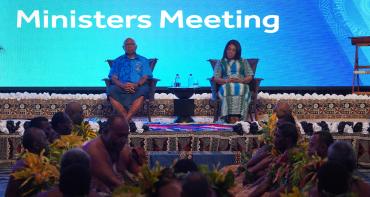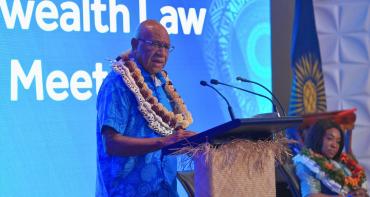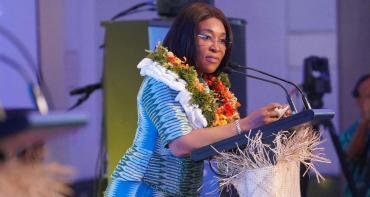Message by Commonwealth Secretary-General Kamalesh Sharma. Mr Sharma is visiting Islamabad, Pakistan, from 16 to 19 February, 2012.
Pakistan holds a special place in the Commonwealth. It is one of the eight countries that came together in 1949 to lay the foundations of the modern Commonwealth. Since then, Pakistan has been on a national journey, and so too has the Commonwealth as it has grown in global size, relevance and impact. Today, the Commonwealth has 54 member countries in every continent, of every size and stage of development, accounting for one third of humanity. And Pakistan remains a highly valued member.
A visit to Pakistan for a Commonwealth Secretary-General is always an opportunity to take the pulse of the relationship – to seek direction from leaders in Pakistan on how it wants to see the Commonwealth continue to grow, and to see how the Commonwealth can continue to support and add value to Pakistan nationally. We always meet political leaders but also a wide range of others in society to discuss how the Commonwealth can offer partnership, to strengthen our global networks and collaborations, and to advance the fundamental values and principles which lie at the heart of our Commonwealth family.
Our Commonwealth values are not so unique. The difference is that our member countries have committed voluntarily and without obligation to uphold them: there is no external judgementalism. Our members place the responsibility upon themselves to honour their commitments in word and practical deed, to be accountable, and allow themselves to be judged by their Commonwealth peers accordingly.
Our values embrace a commitment to the rule of law, human rights, democracy, good governance, development, gender equality, freedom of expression and civil society. Our principles embrace inclusiveness, common action, accountability and transparency.
The last two Commonwealth summits of our political leaders, in 2009 and 2011, gave fresh life and importance to the Commonwealth, and its relevance to individual Commonwealth citizens in their daily lives. Commonwealth leaders agreed to the Affirmation of Commonwealth Values and Principles, and they strengthened the remit of the Commonwealth Ministerial Action Group - a body of foreign ministers that deals with persistent or serious violation of our political values.
The bar has been lifted for all member governments: they have agreed of their free will to abide ever more faithfully to the Commonwealth’s values, and there is agreement to allow earlier and more active engagement by the Commonwealth in a constructive spirit when those values are at risk.
As the Commonwealth has reformed itself, it has worked hard to ensure that the voices of people at the grassroots are taken into account. Two years ago, an Eminent Persons Group (EPG) was formed including the distinguished Asma Jahangir. The EPG very deliberately consulted widely, and equally deliberately called its report, 'A Commonwealth of the People'. The EPG came up with more than 100 recommendations for sharpening the impact, strengthening the networks and raising the profile of the Commonwealth.
Much of the focus of the EPG report was on ensuring that the Commonwealth delivers value for its two billion citizens by creating an environment for advancing its values and harnessing potential, improving livelihoods, and promoting prosperity and respect for diversity.
We are committed to a continual deepening and strengthening of our work in Pakistan to advance the three ‘Ds’ that guide the Commonwealth: democracy, development and diversity in any way it wants.
We support dialogue as a way of resolving and advancing national issues, which is why Parliament and civil society and democracy at all levels are so important. The shared Commonwealth perspective is that tolerance, respect, understanding and freedom are essential to the development of healthy, democratic and prosperous societies. Our Commonwealth approach is anchored in an appreciation of multiple identities and in our celebration of diversity in a globalised and interconnected world. This year, our Commonwealth theme is 'Connecting Cultures'. It will be celebrated especially on Commonwealth Day – Monday, 12 March.
The 'Connecting Cultures' theme is intended to explore not only our appreciation of other cultures and our Commonwealth tapestry of diversity, but also to explore how we can use culture to build bridges between us. The idea of Commonwealth cultural festivals, especially supported by Pakistan, is being advanced.
Our starting point is not to look at other people simply according to their faith, or gender, or through some other single lens. All of us individually are far more complex than that. And so, building peace should begin by recognising that all of us can be seen through a multitude of lenses at the same time: nationality, faith, gender, family status, musical preferences, cultural preferences, hobbies, sporting passion, and so on. Our challenge is to find the common points for humanity in all this complexity and to build on those first rather than on the differences.
Commonwealth values also include democracy at local level so that communities have the opportunity to elect representatives to advance their interests and local concerns. This commitment to local democracy is found in the Commonwealth Aberdeen Principles, endorsed by all member countries. It is to be applauded that it is also embedded in the constitution of Pakistan.
The Commonwealth will always be on the road of democracy, development and diversity with citizens in all our member countries. Pakistan can continue to count on the Commonwealth as a trusted partner.



